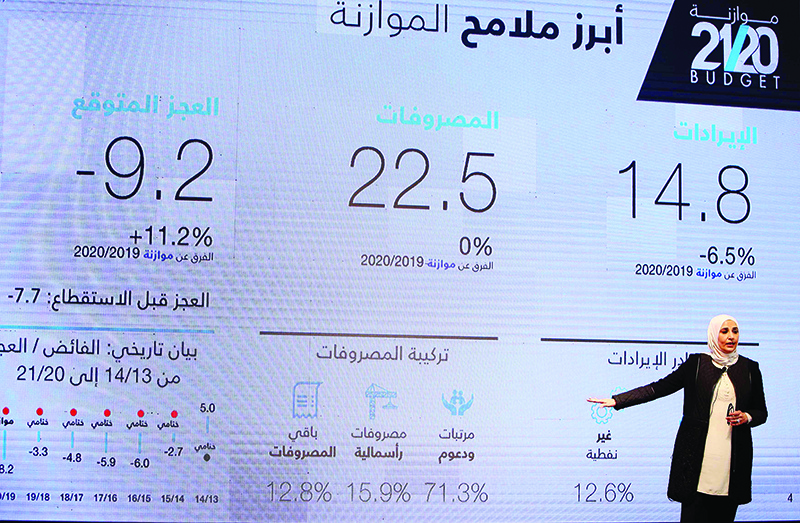By B Izzak and Nawara Fattahova

KUWAIT: The Cabinet yesterday approved the 2020/2021 budget projecting yet another huge deficit for the sixth year in a row due to lower oil prices and production as Kuwait complies with the OPEC+ output cuts to support prices. The deficit is projected to reach KD 7.72 billion, even higher than the current 2019/2020 fiscal year, although the government kept spending unchanged at KD 22.5 billion.
The budget shortfall grows even higher to reach KD 9.2 billion after the compulsory 10 percent deduction from revenues - KD 1.48 billion this year - for the Future Generations Fund. Revenues are estimated at KD 14.8 billion, some 6.0 percent lower than projections in the current year. Over 87 percent of revenues come from oil, whose income is projected at KD 12.9 billion, around 7.0 percent below this year's estimates. Revenue Kuwait earns from investments through the sovereign wealth fund is not included in the budget.
Finance Minister Mariam Al-Aqeel said the budget deficit is due to low oil prices and lower production due to Kuwait's commitment to the OPEC+ cuts. The minister said the government will likely draw from the state reserve fund to plug the deficit gap, because the National Assembly has refused to approve the public debt law.
Aqeel said the government plans to push for the approval of the debt law to allow the government to borrow to meet the budget deficit, because borrowing is cheaper than withdrawing from sovereign wealth funds. The state has a sovereign wealth fund worth more than $600 billion, providing a cushion for state finances. The minister said the government also wants another reform bill passed by the Assembly to allow the government to impose selective taxes like other Gulf Cooperation Council (GCC) states.
Kuwait has only increased the prices of fuel for all and electricity for expats in a bid to cut the budget deficit, but has been unable to impose other taxes due to strong opposition from MPs, who insist that they will not allow the government to meet the budget deficit at the expense of citizens and want the government to stop squandering public funds first. The minister said over 71 percent or KD 16 billion is allocated for wages and subsidies, with the latter accounting for KD 4 billion - half of it for fuel and power subsidies. The government also spends around KD 40 million for employing Kuwaitis in the private sector.
Aqeel said that oil revenues are estimated at KD 12.9 billion calculated on the basis of $55 a barrel. Oil prices currently hover around $65 a barrel. She said that the breakeven oil price required for Kuwait to post no deficit is $81 a barrel and rises to $86 a barrel if the deduction from revenues is counted. Although the government has kept a lid on spending, capital expenditures rose to 16 percent of total spending. The budget will become effective only after it is passed by the Assembly, most likely in June.
"We expect an increase in oil production after the OPEC decision ends, as it is a temporary decision. Expenses will be redistributed according to priorities, which will help in preserving the general reserves more than expected," noted Khaled Mahdi, Secretary General of the General Secretariat of the Supreme Council for Planning and Development.
The 2020/2021 budget is a result of joint work between the ministry of finance and the supreme council. "This budget includes governmental priorities and understanding of the present challenges without affecting capital and investment spending. Clear optimization of this budget is seen in fixed capital spending of 16 percent," he added.
"The deficit should drop by the end of this year as the price of oil is higher than the average price used for calculating the budget. We have executed and carried out many projects, but their results won't appear in the budget before approximately two years," stressed Abdulghafar Al-Awadhi, Assistant Undersecretary for the Public Budget Affairs at the Ministry of Finance.










